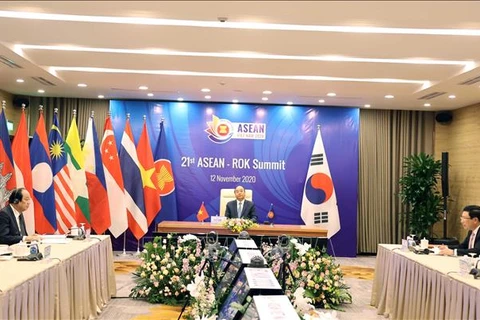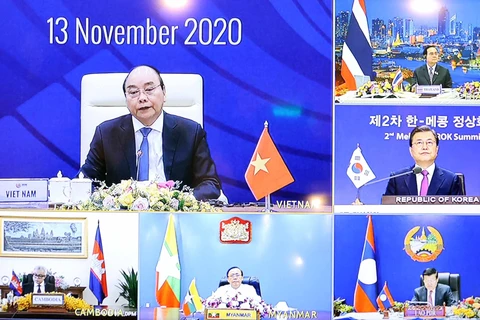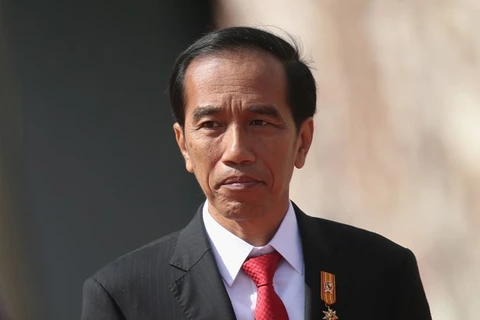Hanoi (VNA) - Mekong countries and the Republic of Korea (RoK) on November 13 agreed to lift bilateral relations to a strategic partnership.
This came during the second Mekong-RoK Summit, held in the form of a video conference and co-chaired by Prime Minister Nguyen Xuan Phuc and RoK President Moon Jae-in.
The parties also agreed to bolster cooperation in seven priority fields of cooperation (culture and tourism, human resources development, agriculture and rural development, infrastructure, information and communications, environment, and non-traditional challenges), improve the resilience of regional supply chains, and create the best conditions possible for business activities in all countries.
Leaders also encouraged the participation of localities and businesses, and underlined the necessity of further bolstering coordination between Mekong-RoK cooperation and ASEAN, along with other Mekong cooperation mechanisms.
They consented to work together in holding joint events within the framework of the “2021 Mekong-RoK Exchange Year”, which will mark the 10th anniversary of the cooperation mechanism.
This second summit offered a chance for the parties to review the implementation of the Mekong-Han River Declaration and discuss cooperation orientations in the new context, thus elevating cooperation to new heights.
Countries took note of the positive results recorded in the seven priority fields of cooperation, and particularly the establishment of the Mekong-RoK Joint Research Centre on Mekong River Water Resources Management and the Mekong-RoK Biodiversity Centre, as well as projects and activities in cultural heritage conservation and restoration, rural development, and forestry, among others.
Mekong countries spoke highly of the RoK’s aid for the region through the Mekong-RoK Cooperation Fund (MKCF) and official development assistance (ODA), which they said help strengthen regional links and sustainable development and contribute to the building of the ASEAN Community.
The countries also voiced concern over drought, saline intrusion, and flooding in the Mekong region, and agreed to enhance cooperation in water management, climate change adaptation, and natural disaster response.
They also affirmed their determination to foster cooperation in multiple spheres, in an effort to surmount the obstacles and challenges facing economic recovery.
Addressing the summit, PM Phuc said that with strong commitments from and the resolve of member countries, cooperation between Mekong countries and the RoK has developed in both depth and width.
He called on the countries to prioritise smart agricultural development via the sharing of experience and technology, and the development of high-quality human resources through scholarship programmes.
They should bolster the exchange of experts, encourage RoK corporations to form labour training models at universities and vocational schools, and fortify cooperation in climate change adaptation and natural resources management, he added.
Leaders also agreed on a joint statement.
Cambodia and the RoK will co-chair the third summit, slated for next year.
The first Mekong-RoK Summit was convened in November 2019 in Busan, the RoK, during which countries consented to cooperate on the basis of the three pillars of people, prosperity, and peace./.
























